- Have any questions? Contact us!
- info@dr-rath-foundation.org

The Großraum-Kartell – Greater Sphere Cartel – and its organisational framework
November 6, 2008
Oil and Drug Cartel Plans “Global Coup” through IMF
November 13, 2008Towards a World of Health and Social Justice for All
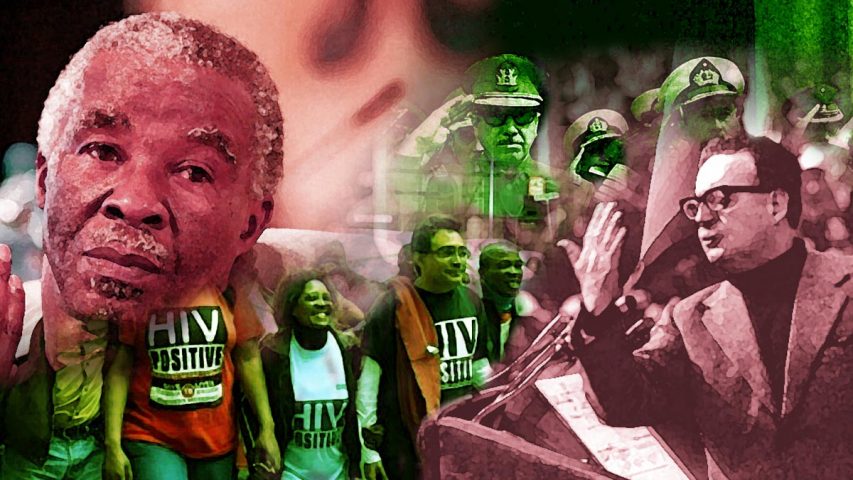
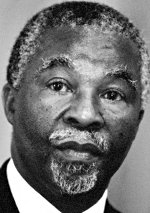
Thabo Mbeki
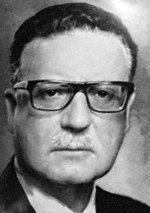
Salvador Allende
The truth about the coups against
Thabo Mbeki and Salvador Allende
This section of our website is dedicated to the progress of mankind towards a world of Health and Social Justice. These goals cannot be achieved without ending the imbalance between rich and poor nations. Lessening the dependency of the developing nations on the economic power of the industrialized world has been a hallmark of progressive movements and their leaders. Conversely, cementing this economic imbalance has been the target of those interested in preserving the status quo.
In the modern world it has become increasingly difficult for the interests behind the status quo to maintain the economic imbalance with sheer force. Increasingly they are forced to resort to hiding their true intentions and even parading under the flag of progressive movements.
Creating this confusion among the people is part of preserving the status quo. It is not difficult, however, to unmask these tactics. The only question one has to ask is: does a political force decrease the dependency on rich countries and multinational corporations, or increase it?
The liberation of mankind from colonial structures and modern forms of global economic dependency has not been a straight road. Repeated setbacks have been imposed on this movement by global financial and economic interests.
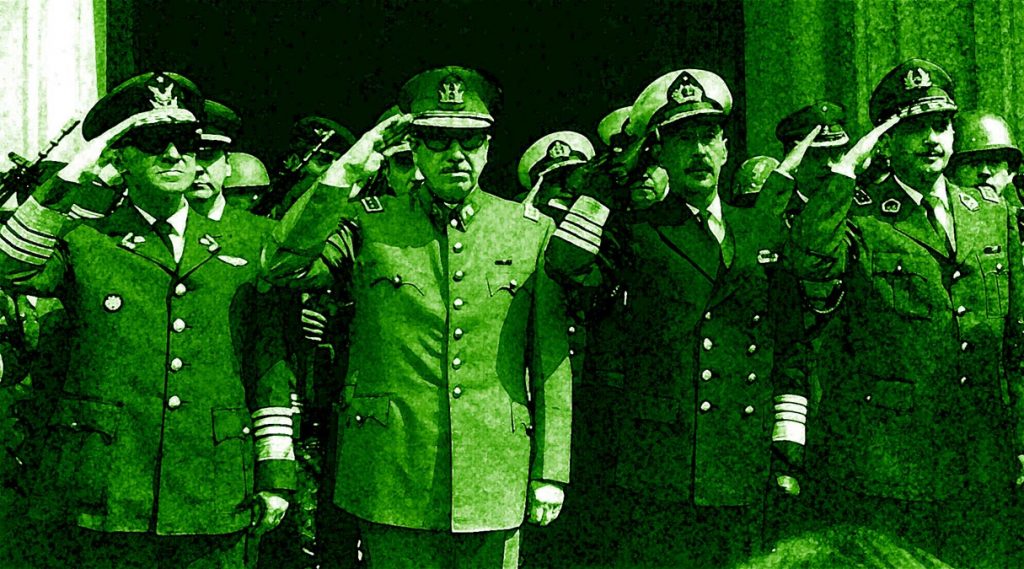
Minutes (PDF, 139 kB) recording the first meeting between CIA director Richard Helms and high agency officials on covert operations against Allende.
A two-page memorandum of conversation (PDF, 167 kB), the final paragraph of which concludes with Henry Kissinger ordering the CIA to “continue keeping the pressure on every Allende weak spot in sight.”
A four-page cable (PDF, 408 kB) from CIA deputy director of plans, Thomas Karamessines, who conveys Henry Kissinger’s orders to CIA station chief in Santiago, Henry Hecksher: “It is firm and continuing policy that Allende be overthrown by a coup.” The “operating guidance” makes it clear that these operations are to be conducted so as to hide the “American hand,” and that the CIA is to ignore any orders to the contrary from Ambassador Korry who has not been informed of Track II operations.
Three cables (PDF, 469 kB) between CIA headquarters in Langley, VA., and the CIA Station in Santiago addressing the secret shipment of weapons and ammunition for use in the plot to kidnap the Chilean military commander, General Rene Schneider.
An options paper (PDF, 1.73 MB), prepared for Henry Kissinger and the National Security Council on the day of Allende’s inauguration, laying out U.S. objectives, interests and potential policy toward Chile. U.S. interests were defined as preventing Chile from falling under Communist control and preventing the rest of Latin America from following Chile “as a model.”
A CIA report (PDF, 1.55 MB) summarizing its efforts to prevent Allende’s ratification as president and to foment a coup in Chile.
Strategy papers (PDF, 4.38 MB) prepared by an inter-agency Ad Hoc Working Group on Chile in response to a directive from Kissinger, showing that the Richard Nixon administration had engaged in an invisible economic blockade against Allende and intervened at the World Bank.
A situation report (PDF, 447 kB) prepared by U.S. Naval attache Patrick Ryan which reports positively on events in Chile during the coup. Ryan characterizes September 11 as “our D-Day”; states that the coup was “close to perfect”; and provides glowing commentary on the character of the Pinochet’s regime.
A memo (PDF, 570 kB) on ‘Chilean Executions’ sent to the Secretary of State by Jack Kubisch which states that summary executions in the nineteen days following the coup totalled 320 – more than three times the publicly acknowledged figure.
A memo (PDF, 326 kB) in which Henry Kissinger lists the “serious threats” he perceived Allende to pose to U.S. interests in the region and the world, including $1 billion worth of U.S. investments that could be lost.
A memorandum of conversation (PDF, 425 kB) in which Henry Kissinger tells the dictator Augusto Pinochet in a face-to-face meeting that “In the United States, as you know, we are sympathetic with what you are trying to do here.”
A formerly secret transcript of a telephone conversation (PDF, 369 kB) in which Henry Kissinger admits “we helped them” in the coup and that “[deleted reference] created conditions as great as possible”.
In the 21st century a key setback was the coup d’état against South African President Thabo Mbeki in 2008. The motives behind any forced regime change are generally exposed by the first major political turnaround of the new regime. In the case of South Africa, this was the announcement by the new government of a “U-turn on AIDS policy. Behind this headline stood the political decision to remove all remaining barriers for the mass importation and distribution of toxic, patented ARV drugs.
If there was any scientific proof that ARV drugs are the “life-saving” solution to the AIDS epidemic, then this coup would have been in the interests of the South African people. Unfortunately, there is no such scientific evidence.
This means that there must have been other reasons for the coup against President Mbeki. As we document on this website, forcing Mbeki to step down not only endangered the health and lives of millions of people in South Africa, it exponentially accelerated the economic dependency of the South African economy on multibillion dollar drug companies. The global pharmaceutical business with patented drugs is a more than one trillion dollar a year industry that is largely controlled by investment circles around the Rockefeller group.
The historic parallel to the coup d’état against President Mbeki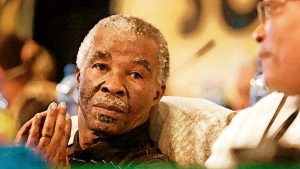
The historic parallel to the coup d’état against President Mbeki is the coup d’état against Chilean President Dr. Salvador Allende on September 11, 1973, and his replacement by the dictator Augusto Pinochet. The parallels between these two historic events are compelling:
- The same economic interests were the beneficiaries of both these coups
The Rockefeller group is not only controlling the global pharmaceutical investment business but has also been a major stakeholder in the chemical, petrochemical, and mining industries. This global economic power center is referred to as the Oil and Drug Cartel.
In the early 1970s Chilean President Allende threatened these global interests with his plan to nationalize the Chilean copper and mining industry.
The cautious policy of the Mbeki government towards the mass distribution of toxic ARV drugs threatened the interests of the multibillion dollar pharmaceutical investment business.
In both of these cases, global economic interests decided to act.
- The political leaders from the same countries – then and now – operate as the stakeholders of the Oil and Drug Cartel
Throughout the twentieth century, the Rockefeller group used the U.S. government, i.e. the White House and the Pentagon, as the political and military arms to protect its interests.
In the late 1960s and early 1970s the U.S. government spent millions of dollars to infiltrate Chilean society, including, as documented in subsequent hearings of the U.S. Congress, through covert CIA operations.
In recent years, the U.S. government has used billions of dollars of taxpayers’ money for programs like PEPFAR. These programs – under the veil of providing ‘modern medicine’ – have been used to infiltrate South African society in the interests of the global drug business. 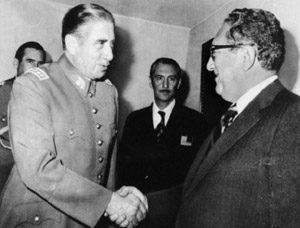 The same political strategists
The same political strategists
Public records document that the coup against the government of Salvador Allende was masterminded by the former head of the Rockefeller Brothers Fund’s “Special Studies Project” and then Secretary of State, Henry Kissinger. Later, Kissinger even celebrated this regime change in a public display of his alliance with Chilean dictator Augusto Pinochet.
Years later, Henry Kissinger is still the link between Rockefeller interests and the White House and, as revealed by Watergate journalist Bob Woodward, served as an intimate advisor to the George W. Bush administration.- The Same Infiltration Strategies
The official report of the U.S. Senate’s “Hearings before the Select Committee to Study Governmental Operations with Respect to Intelligence Activities – Covert Action”, held on December 4th and 5th 1975 in Washington, provide valuable insight into the infiltration strategies of the CIA and similar organizations for a coup d’état in the developing world.
On page 95 of this report, details are provided about the U.S. Secret Service’s “investment” in preparing Chile for the overthrow of the democratically elected President.
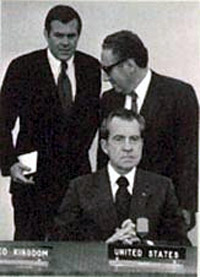 In the years preceding the putsch, opposition parties in Chile and their “propaganda for elections” were financed by the CIA with $8 million.
In the years preceding the putsch, opposition parties in Chile and their “propaganda for elections” were financed by the CIA with $8 million.- Leading up to the overthrow of the Allende government in 1973, the CIA spent $4.3 million for “producing and disseminating propaganda and supporting mass media.” Most of the mass media in South Africa today are part of international conglomerates with close ties to the investment business of the Oil and Drug Cartel.
- To overthrow the Chilean government it was necessary to infiltrate all parts of civil society. To achieve that goal the CIA invested $900,000 for “influencing Chilean institutions: labor, students, peasants, women and supporting private sector organizations.” Today, the leadership of the South African labor organization COSATU has a vested interest in the ARV business. COSATU has pension funds with major direct and indirect investments in the drug industry, including the ARV business. Hence, the COSATU leadership has a financial interest in a government that promotes ARV drugs. Again, this would not be objectionable if there were any controlled clinical studies that show that ARVs prolong the life of patients with AIDS. But there are no such studies. So we must look for other motives as to why the COSATU leadership became one of the motors behind the coup against President Mbeki.
- In Chile the CIA also financed the infiltration of the oil and drug interests into youth organizations and women’s organizations, with the goal of winning their support for the overthrow of the democratically elected President. Millions of members of similar organizations in South Africa today have to demand accountability from their leaderships on this important question.
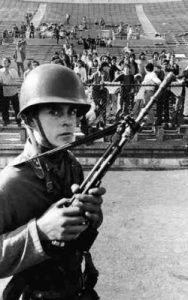
Chile 1973 (left picture) – The democratic forces supporting President Allende were immediately apprehended and incarcerated in the Stadium of Santiago de Chile by the Pinochet Junta.

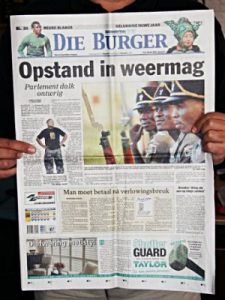
South Africa 2008 (right picture) – On February 7, 2008, on the occasion of President Mbeki’s Opening Speech to Parliament – and two months after Jacob Zuma had taken over control of the ANC – the former pro-Apartheid newspaper “Die Burger” left no doubt about whom they serve. On their title page they openly threaten President Mbeki and his Government with a military coup “Opstand in weermag”. The “Apartheid-left over” (magnified) wears a T-Shirt with a picture of their new leader: 100% Jacob Zuma. There is good reason for the democratic forces of South Africa to be alert and cognizant about history.
The lessons from the compelling historical analogy between Chile in the 1970s and South Africa today are clear:
- The Oil and Drug cartel will seek to protect its economic privileges – even at the expense of the lives and death of millions.
- To cement their global rule, these multinational interests are willing to overthrow any government that threatens their control.
- The Oil and Drug Cartel does not dare to operate in the open but, instead, uses “covert” operations to achieve its goals.
- The key groups of society infiltrated and financed by these cartel interests are civil society groups like trade unions, youth organizations, women’s organizations, and the media.
- A favorite strategy for these interests is to hide their true intention behind deceptive terms like “progressive forces” or “human rights.”
With Chile being such a compelling historical example, there is no need for the people of South Africa to undergo the same agony and decades of dictatorship on behalf of foreign economic interests.
Those who cannot remember the past are condemned to repeat it


